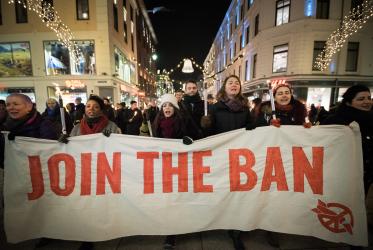Japan first announced plans to dump the wastewater in 2013. Despite strong dissent from churches, other nations, and civil society organizations, Japan confirmed plans to begin discharging the wastewater on 24 August.
General secretary of the Pacific Conference of Churches, Rev. James Bhagwan, referenced a statement made by Fijian prime minister Sitiveni Rabuka to a recent report of the International Atomic Energy Agency which has been disputed by an panel of independent global experts appointed by the Pacific Islands Forum.
“The experts were appointed while Fiji was chair of the Pacific Islands Forum,” said Bhagwan. “For the last decade, the Pacific Conference of Churches has raised its concern on the issue since it was revealed by the Japanese government, in 2013, that radioactive waste from the crippled Fukushima nuclear plant has been leaking into the Pacific Ocean for two years.”
During the march, Rev. Bhagwan further raised his concern that the plan to discharge the wastewater into the Pacific Ocean was actually the cheapest, not the best, solution by Japan.
The Pacific Conference of Churches as long expressed deep concern with the lack of progress made by Pacific states to reverse the decision of the Japanese government and Tokyo Electric Power Company to release more than 1.3 million tonnes of nuclear wastewater into the Pacific Ocean.
In a joint statement released in June, the Pacific Conference of Churches and dozens of other organizations called for a reversal of the decision to dump the wastewater.
“We acknowledge the vast legacy of nuclear testing within the region along with the ongoing climate crisis, both of which will be exacerbated by attitudes which continue to treat rivers and oceans as nuclear dumping sites,” the statement read. “We are aware that the promotion of nuclear power as a climate change solution and the characterization of tritium as a harmless substance continues to prop up a nuclear order which generates billions of dollars at the expense of developing countries and Indigenous communities.”

Rev. James Bhagwan, general secretary of the Pacific Conference of Churches, during the demonstration in Suva, Fiji.





